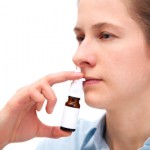I was reading JAMA, the Journal of the American Medical Association, in this case the January 9, 2013 edition, and came upon an abstract of an article from an ENT (Ear, Nose and Throat, AKA Otolaryngology) journal I wouldn't look at normally. The pilot study authored by an MD, PhD and two colleagues from the Washington, DC, Taste and Smell Clinic, involved ten patients who had lost their sense of smell and taste (they're clearly related as both my wife and I can attest). The causes of their condition, medically termed hyposmia and hypogeusia, were varied.
Let's start with a definition: a pilot study is a small-scale preliminary research project prior to attempting a larger, more expensive and expansive effort. So this study is not the last word on the treatment of the two conditions, but only a beacon of hope for those of us who no longer can taste and smell with the same acuity we once did.
These are common conditions, especially as we age. I'll give you links to the NIH's MedlinePlus website patient information for impaired smell and for impaired taste, but my own issue with smell and taste started with allergies and nasal polyps in the 1970s and my wife lost her sense of smell, for unknown reasons, when she was in her late 60s. One of the underlying concepts is much of what we perceive as taste is actually smell; the tongue can only detect four or perhaps five tastes: salty, sour, bitter and sweet are the conventional four I was taught in medical school (probably in grade school in a rudimentary fashion); the fifth is umami, a taste known to the Japanese since the early 1900s and often thought of as meaty or savory (it's best associated with the amino acid glutamate, sold as MSG and some people have reactions to it).
Dr Steven Bromley, now a neurologist in New Jersey, wrote a superb paper on smell and taste disorders when he was still a resident. In the first place those issues are common in the general population, but should not be taken as routine. The most common causes are nasal and sinus disease, URIs and head trauma (10% of the latter group have olfactory impairment). A host of medications and a number of more significant diseases can be causative factors, so especially for those who suddenly lose these senses, a medical review may be in order.
Compensating for loss of smell and taste by adding excessive amounts of sugar and/or salt to your diet can lead to serious consequences. We tend to use a host of spices without salt and to tell guests that we under-salt menu items, so they an add whatever they're used to at the table. When we cook for ourselves we add no salt; for company we tend to use 1/2 to 1/3 of whatever the recipe recommends.
Back to the pilot study: they used both oral and nasal theophylline, a medication historically used for patients with asthma and other lung diseases. The oral form was given for two to twelve months, then stopped for a few weeks (3 to 12) and replaced by a nasal spray of the drug. Past experience with the oral medication showed potential for side effects they wished to avoid. The nasal spray worked better in more patients (8 of 10 versus six of ten) with no adverse effects being noted.
This is obviously only a preliminary study; don't ask your physician for a nasal spray of theophylline yet. Much larger and longer clinical studies need to be done and any of us without an obvious reason for loss of smell and taste should be evaluated for the underlying cause.
But it makes me optimistic that someday some of us may be able to regain those lost senses. Besides enhancing our meals, the other uses of smell and taste, the protective ones that help us distinguish danger (smoke, toxins, pollutants, spoiled food), may be improved.
Here's hoping.



